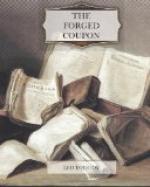“And what about your temperance society?” the student asked his sister.
“What can we do when they are given every opportunity of drinking? Father tried to have the public-house shut up, but the law is against him. And, besides, when I was trying to convince Vasily Ermiline that it was disgraceful to keep a public-house and ruin the people with drink, he answered very haughtily, and indeed got the better of me before the crowd: ’But I have a license with the Imperial eagle on it. If there was anything wrong in my business, the Tsar wouldn’t have issued a decree authorising it.’ Isn’t it terrible? The whole village has been drunk for the last three days. And as for feast-days, it is simply horrible to think of! It has been proved conclusively that alcohol does no good in any case, but invariably does harm, and it has been demonstrated to be an absolute poison. Then, ninety-nine per cent. of the crimes in the world are committed through its influence. We all know how the standard of morality and the general welfare improved at once in all the countries where drinking has been suppressed—like Sweden and Finland, and we know that it can be suppressed by exercising a moral influence over the masses. But in our country the class which could exert that influence—the Government, the Tsar and his officials—simply encourage drink. Their main revenues are drawn from the continual drunkenness of the people. They drink themselves—they are always drinking the health of somebody: ‘Gentlemen, the Regiment!’ The preachers drink, the bishops drink—”
Again the guide touched the head of the young Tsar, who again lost consciousness. This time he found himself in a peasant’s cottage. The peasant—a man of forty, with red face and blood-shot eyes—was furiously striking the face of an old man, who tried in vain to protect himself from the blows. The younger peasant seized the beard of the old man and held it fast.
“For shame! To strike your father—!”
“I don’t care, I’ll kill him! Let them send me to Siberia, I don’t care!”
The women were screaming. Drunken officials rushed into the cottage and separated father and son. The father had an arm broken and the son’s beard was torn out. In the doorway a drunken girl was making violent love to an old besotted peasant.
“They are beasts!” said the young Tsar.
Another touch of his guide’s hand and the young Tsar awoke in a new place. It was the office of the justice of the peace. A fat, bald-headed man, with a double chin and a chain round his neck, had just risen from his seat, and was reading the sentence in a loud voice, while a crowd of peasants stood behind the grating. There was a woman in rags in the crowd who did not rise. The guard gave her a push.
“Asleep! I tell you to stand up!” The woman rose.




